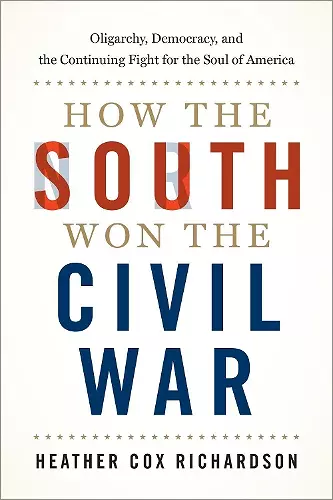How the South Won the Civil War
Oligarchy, Democracy, and the Continuing Fight for the Soul of America
Format:Hardback
Publisher:Oxford University Press Inc
Published:23rd Jul '20
Should be back in stock very soon
This hardback is available in another edition too:
- Paperback£15.99(9780197581797)

In this provocative new work, Heather Cox Richardson argues that while the North won the Civil War, ending slavery, oligarchy, and giving the country a "new birth of freedom," the victory was short-lived. Settlers from the East pushed into the West, where the seizure of Mexican lands at the end of the Mexican-American War and treatment of Native Americans cemented racial hierarchies. The Old South found a new home in the West. Both depended on extractive industries--cotton in the former and mining, cattle, and oil in the latter--giving rise to a white ruling elite, one that thrived despite the abolition of slavery, the assurances provided by the 13th, 14th, and 15th Amendments, and the economic opportunities afforded by Western expansion. How the South Won the Civil War traces the story of the American paradox, the competing claims of equality and white domination that were woven into the nation's fabric from the beginning. Who was the archetypal "new American"? At the nation's founding it was Eastern "yeoman farmer," independent and freedom-loving, who had galvanized and symbolized the Revolution. After the Civil War the mantle was taken up by the cowboy, singlehandedly defending his land and his women against "savages," and protecting his country from its own government. As new states entered the Union in the late nineteenth century, western and southern leaders found common ground. Resources, including massive amounts of federal money, and migrants continued to stream into the West during the New Deal and World War II. "Movement Conservatives"--starting with Barry Goldwater--claimed to embody cowboy individualism, working with Dixiecrats to renew the ideology of the Confederacy. The "Southern strategy" worked. The essence of the Old South never died and the fight for equality endures.
It should be required reading for this particular moment in American politics. * Thomas Zimmer, The Guardian *
Richardson's clear prose makes this book incredibly lively and accessible. * Joseph Angelillo, ALPATA: A Journal of History *
Heather Cox Richardson, a professor of history at Boston College, explains Goldwater's crusade and the trajectory of modern conservatism in her masterful How the South Won the Civil War: Oligarchy, Democracy, and the Continuing Fight for the Soul of America. A timely book, it sheds light on what was perhaps the most important political coalition of the 20th century. * The Washington Post *
Good revisionist history jars you, forces you to look at the past in a new way, and thereby transforms your view of the present. Heather Cox Richardson is a master of the genre, to the benefit of us all. Even those who take issue with her will be forced by this powerful book to come to terms with aspects of our past that we often just sweep under the rug of memory. * E.J. Dionne, Jr., author of Code Red: How Progressives and Moderates Can Unite to Save Our Country *
In a tour de force, Richardson exposes the philosophical connective tissue that runs from John C. Calhoun, to Barry Goldwater, to Donald Trump. It's not party, it's a complex ideology that has swaddled white supremacy and its political, legal, economic, and physical violence in the language of freedom and rugged individualism, and, in doing so, repeatedly slashed a series of self-inflicted wounds on American democracy. * Carol Anderson, Emory University, author of One Person, No Vote: How Voter Suppression is Destroying our Democracy *
The themes are broad and the implications mighty, but this isn't history from on high. Richardson uses a human lens to tell her tale, revealing the passions and power-plays that have sustained this battle for dominance. The end result is something rare and invaluable: a skilled work of history, deeply grounded in the past, that speaks loudly, clearly, and crucially to the present. * Joanne Freeman, Yale University, author of The Field Of Blood: Violence in Congress and the Road to Civil War *
What the great books do is retell history in a way that creates a deepened and clarified connection between what was an what is. I love this book. For anyone seeking to understand how we got here, and where we're likely bound, this is a must-read. * Ron Suskind, Pulitzer Prize-winning journalist and author of The Price of Loyalty and A Hope in the Unseen *
If you want to understand this moment in American politics, here's a suggestion for you: It's the must-read book of the year. * Bill Moyers, Moyers on Democracy *
Heather Cox Richardson's skill with connecting events into a cohesive narrative is on full display in this brilliant study...This book speaks to the heart of life in the United States and should be in every private, public, and school library. * Deborah M. Liles, Southwestern Historical Quarterly *
... Richardson suggested that her most recent book, How the South Won the Civil War, was her "smartest". There is no doubt that it is, at the very least, her most ambitious. * Catherine McNicol Stock, Connecticut College, The Annals of Iowa *
- Winner of Winner, Robert M. Utley Prize, Western History Association Named one of The Washington Post's 50 Notable Works of Nonfiction.
ISBN: 9780190900908
Dimensions: 239mm x 157mm x 31mm
Weight: 499g
272 pages